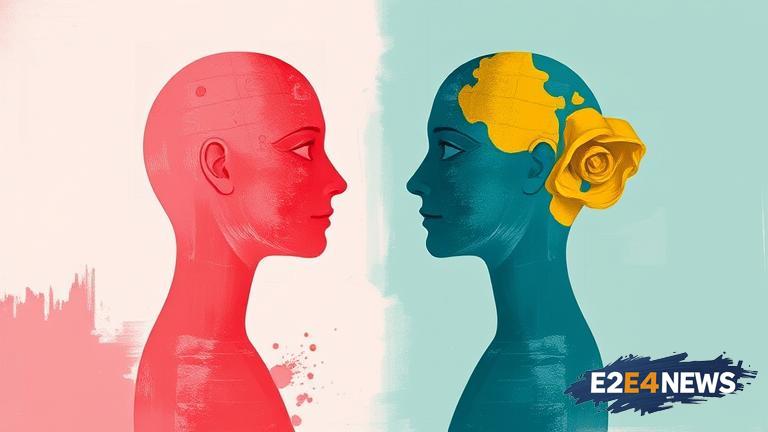The concept of gender has long been a topic of discussion and debate, with many of us assuming that our understanding of it is based on conscious thought and rational consideration. However, recent research suggests that our perceptions of gender are, in fact, heavily influenced by unconscious biases and stereotypes. These biases, which operate beneath the surface of our conscious awareness, can have a profound impact on our thoughts, feelings, and behaviors, often leading us to act in ways that are discriminatory or unfair. One of the primary ways in which unconscious bias affects our understanding of gender is through the perpetuation of traditional stereotypes. For example, many people still hold the unconscious assumption that men are inherently more aggressive or dominant than women, while women are seen as more nurturing or submissive. These stereotypes can lead to a range of negative consequences, including discrimination in the workplace, unequal pay, and limited opportunities for advancement. Furthermore, unconscious bias can also influence our perceptions of gender identity, with many people holding unconscious assumptions about what it means to be a man or a woman. This can lead to marginalization and exclusion of individuals who do not conform to traditional gender norms, including those who identify as transgender or non-binary. In addition to perpetuating stereotypes, unconscious bias can also affect our attitudes towards gender-based violence. For instance, many people still hold the unconscious assumption that victims of domestic violence or sexual assault are somehow to blame for the abuse they have suffered. This can lead to a lack of empathy and support for victims, as well as a failure to hold perpetrators accountable for their actions. The impact of unconscious bias on our understanding of gender is not limited to individual attitudes and behaviors. It can also have a profound impact on our social and cultural institutions, including our education system, media, and government policies. For example, the perpetuation of traditional stereotypes in media and advertising can reinforce unconscious biases and contribute to a culture of discrimination and inequality. Similarly, education systems that fail to address issues of gender and sexuality can perpetuate unconscious biases and limit opportunities for students to develop a nuanced understanding of these issues. To combat the effects of unconscious bias, it is essential that we develop a greater awareness of our own thought patterns and behaviors. This can involve engaging in self-reflection and critical thinking, as well as seeking out diverse perspectives and experiences. Additionally, institutions and organizations can play a critical role in addressing unconscious bias by implementing policies and practices that promote diversity, equity, and inclusion. This can include providing training and education on issues of gender and sexuality, as well as implementing policies that promote equal pay, opportunities, and representation. Ultimately, the key to overcoming unconscious bias and promoting a more nuanced understanding of gender is to approach these issues with a critical and open-minded perspective. By recognizing the ways in which our unconscious biases shape our perceptions of gender, we can begin to break down the barriers that prevent us from achieving true equality and inclusivity. This requires a willingness to challenge our own assumptions and biases, as well as a commitment to creating a more just and equitable society for all. The journey towards greater awareness and understanding of unconscious bias is not an easy one, but it is a necessary step towards creating a more inclusive and compassionate world. As we continue to navigate the complex and often fraught terrain of gender and sexuality, it is essential that we prioritize self-reflection, critical thinking, and a commitment to social justice. By doing so, we can work towards a future where everyone has the opportunity to thrive, regardless of their gender identity or expression. The importance of addressing unconscious bias cannot be overstated, as it has the potential to transform our understanding of gender and promote a more inclusive and equitable society. As we move forward, it is essential that we prioritize education, awareness, and activism, working to create a world where everyone has the opportunity to reach their full potential. The fight against unconscious bias is an ongoing one, but with persistence, dedication, and a commitment to social justice, we can create a brighter, more inclusive future for all. In conclusion, the role of unconscious bias in shaping our understanding of gender is a complex and multifaceted issue, one that requires careful consideration and critical thinking. By acknowledging the ways in which our unconscious biases influence our perceptions of gender, we can begin to break down the barriers that prevent us from achieving true equality and inclusivity. As we continue to navigate the complexities of gender and sexuality, it is essential that we prioritize self-reflection, education, and activism, working towards a future where everyone has the opportunity to thrive.
